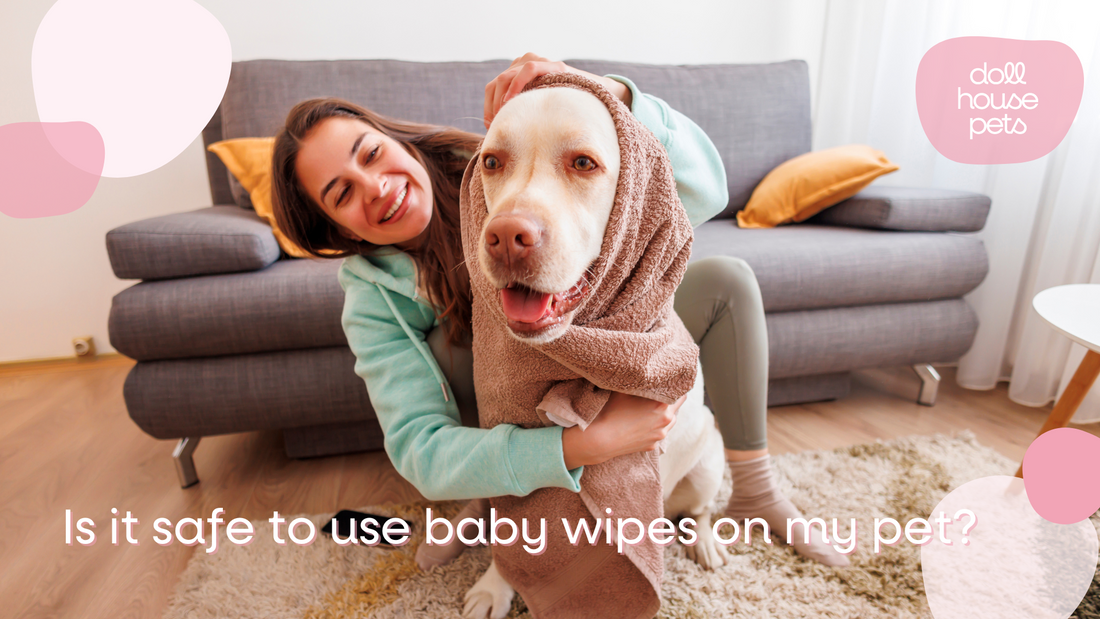
Is it safe to use baby wipes on my pet?
As a pet owner, you might have found yourself reaching for baby wipes as a quick solution for cleaning your furry friend after a muddy walk or to freshen them up in between baths. Baby wipes are convenient and easy to use, but the question remains: are they safe for your pets? While baby wipes are gentle on human skin, they may not always be suitable for your pets, as their skin and needs differ from ours. Here's what you need to know about using baby wipes on your pets.
1. What’s in Baby Wipes?
Before using baby wipes on your pet, it's important to understand the ingredients typically found in them. Most baby wipes contain:
- Water: The base of the wipe, which helps with cleaning.
- Preservatives: These prevent bacterial growth in the wipes.
- Fragrances: Added to give the wipes a fresh scent.
- Soothing ingredients: Such as aloe vera or chamomile, which can be gentle on human skin.
- Surfactants: These help lift dirt and grime.
While these ingredients are designed to be safe for babies, they may not be ideal for pets. Some of these substances could potentially cause irritation or allergic reactions in animals, particularly if they have sensitive skin.
2. Why Baby Wipes May Not Be Ideal for Pets
While baby wipes are marketed as gentle and safe for babies, pet skin is quite different from human skin. Here’s why baby wipes may not always be the best choice for your furry friend:
- Potential Irritants: Baby wipes often contain fragrances, preservatives, and other chemicals that can be harsh on your pet’s sensitive skin. Pets, especially dogs and cats, are more prone to developing skin irritation or allergies from these substances.
- Dryness or Imbalance: Many baby wipes are designed to be moisturizing for human skin, but they may not provide the proper moisture balance for your pet’s skin. Overuse of baby wipes could leave your pet’s skin dry, which may lead to discomfort or further skin problems.
- Toxic Ingredients: Some baby wipes may contain chemicals like alcohol or phthalates, which can be harmful to pets if ingested or absorbed through the skin. Pets often lick themselves after being cleaned, and ingesting these chemicals could lead to toxicity.
- Not Designed for Pets’ pH Levels: Humans and pets have different skin pH levels. Baby wipes are formulated for the slightly acidic pH of human skin, while most pets, especially cats and dogs, have a more alkaline skin pH. Using wipes that aren’t pH-balanced for pets may disrupt their skin's natural barrier and cause irritation.
3. When It’s OK to Use Baby Wipes on Pets
While baby wipes aren’t the ideal choice for regular cleaning, there may be some situations where they’re safe to use, provided you choose the right wipes and use them sparingly.
- Quick Fix for Dirty Paws: If your dog or cat has been out in the mud, baby wipes can be useful for quickly wiping down their paws before they track dirt around the house. Be sure to choose fragrance-free, alcohol-free wipes to avoid irritation.
- Spot Cleaning: For a quick clean-up of small areas, such as a stain on your pet’s fur or a spot on their face, baby wipes may be an easy solution. Again, use wipes that are free of fragrances and other harsh chemicals.
- For Pets with Healthy, Non-Sensitive Skin: If your pet has relatively healthy skin and isn’t prone to allergies or sensitivities, using baby wipes occasionally for emergency cleaning may be safe. However, it's still important to avoid using wipes on their face, eyes, or ears, as these areas are more sensitive.
4. Alternatives to Baby Wipes for Pets
If you’re concerned about the safety of baby wipes, there are plenty of alternatives designed specifically for pets that are much safer and more effective.
- Pet-Specific Wipes: Look for pet grooming wipes that are formulated with your pet’s needs in mind. These wipes are usually free of harmful chemicals, alcohol, and fragrances and are designed to be gentle on your pet’s skin. They’re a great option for spot cleaning, wiping down paws, or freshening up your pet between baths.
- Aloe Vera Wipes: Wipes containing aloe vera are often more suitable for pets, as aloe is soothing and hydrating. These wipes are typically safe for pets with sensitive skin.
- Pet-safe Towels or Cloths: For cleaning larger areas or giving your pet a gentle rub down, a soft, damp towel can be a good alternative to wipes. Just make sure the towel is clean and free from harsh detergents or chemicals.
- Dry Shampoos: If your pet needs a more thorough clean without a bath, consider using a pet-safe dry shampoo. These are available in sprays or powders and can be massaged into your pet’s coat to absorb dirt and oils.
- Regular Bathing: Regular baths are essential for keeping your pet clean and healthy, and using a pet-safe shampoo can help maintain their skin and coat. Bathing is often a better option than wiping down your pet with wipes, as it ensures a deeper clean.
5. Signs Your Pet May Be Having a Reaction
If you’ve used baby wipes on your pet and notice any of the following signs, it may indicate that they’re having an adverse reaction:
- Red, irritated, or inflamed skin: This is a clear sign that the wipes may have caused irritation.
- Excessive scratching or licking: If your pet is licking or scratching the area where they’ve been wiped, it could mean they’re experiencing discomfort or an allergic reaction.
- Swelling or bumps: If you notice any swelling or bumps on your pet’s skin after using baby wipes, discontinue use immediately and consult your vet.
- Digestive issues: If your pet has ingested any of the baby wipe chemicals, they may exhibit symptoms like vomiting, diarrhea, or drooling. Contact your vet immediately if this occurs.
Conclusion
While baby wipes may seem like a convenient option for cleaning your pet, they’re not always the safest or most suitable choice. The chemicals and fragrances found in baby wipes can irritate your pet’s skin and cause other health issues. It’s best to use pet-specific wipes or other safe alternatives that are designed with your pet’s health in mind. Always monitor your pet for signs of irritation or discomfort, and if in doubt, consult your vet about the best cleaning products for your pet’s grooming routine.



